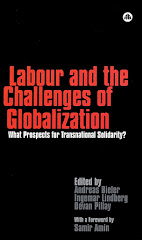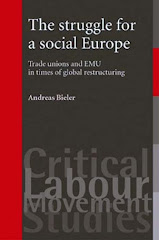The establishment of the International
Trade Union Confederation (ITUC) in November 2006, resulting from a merger
of the International Confederation of Free Trade Unions (ICFTU) and the World
Confederation of Labour (WCL), was greeted with enthusiasm by labour movements
from around the world. A united, stronger international trade union promised
greater input on global politics towards more equality. Since then, many trade
unions especially in the Global South have become disillusioned with the ITUC. In
this post, I will assess to what extent the ITUC is prepared for the key
challenges of the global economy in the 21st century.
Two key challenges for the ITUC can be identified in the global
economy, the increasing inequality between developed and developing countries,
between the rich and the poor, and the expanding informal sector of the
economy. In relation to the former, the ITUC’s role has been challenged by
trade unions from the Global South and here in particular the South African Cosatu.
Reflecting on the ITUC’s World Congress in 2010 in Vancouver/Canada, Bongni
Masuku, the International Secretary of Cosatu, made a stinging attack on the
Northern dominance within the ITUC. Dominated by the big four Northern unions
AFL-CIO (USA), DGB (Germany), TUC (Britain) and RENGO (Japan), the ITUC would
defend the current system and safeguard the interests of capital, it is alleged.
‘Despite much talk about trade union independence, the dominant affiliates of
the ITUC are not independent of their ruling classes, even if they
organisationally seem to be, but they are politically tied to the ruling
establishment, hence their vociferous defence of the system’ (Masuku, 2010:
64). Ultimately, it would be the working classes of the Global South, who are
the victims of this situation, as they are considered to be affected worst by
‘the viciousness of the global system’. In other words, the ITUC dominated by
big Northern trade unions, is accused of co-operating with capital in the
continuing exploitation of the South. Unsurprisingly, Southern labour movements
increasingly question the use of the ITUC in the representation of their
concerns. Transforming the ITUC would take too long. The main emphasis should
be placed on organising the Global South instead and developing a South-South
strategy in the interest of Southern workers through new institutions such as
the Southern Initiative on Globalisation
and Trade Union Rights (SIGTUR; http://www.sigtur.com/,
31/05/2011) (Masuku,
2010: 65). This criticism has led to an institutional challenge of the ITUC
more recently. Cosatu’s affiliates – Nehawu, Numsa, Ceppwawu and Popcru, who
are already members of the rival World
Federation of Trade Unions (WFTU) – are currently ‘lobbying other Cosatu
affiliates to support a resolution in September [2012], when Cosatu holds its
congress, for the federation to cancel its membership of ITUC and join the WFTU’
(Sowetan,
10 February 2012). Whether this will actually happen remains to be seen.
What is clear, however, is that labour movements in the Global South are
increasingly sceptical of the role played by the ITUC and here in particular by
the big national trade unions in industrialised countries.
The second big challenge is the increasing informalisation of the
global economy. This re-organisation of the production process around
transnational outsourcing and centralisation of decision-making as part of
globalisation, together with a huge influx into urban areas particularly in the
Global South, has led to an increasing casualisation and informalisation of the
global economy, in which permanent, full-time employment contracts have to a
large extent become a feature of the past. In a way, ‘it is no longer accurate
today’, Dan Gallin argued already in 2001, ‘to describe the informal sector as
“atypical”’ (Gallin, 2001: 228). It has increasingly become the norm. This is
especially the case in developing countries, which had never been in a position
to establish a large industrial sector with permanent and secure employment
(Bieler, Lindberg and Pillay, 2008: 266). Nevertheless, informalisation more
and more also affects developed countries in the North, where employers are on
the offensive and demand a flexibilisation of the labour market with the
argument that this would be necessary in order to retain competitiveness. Peter
Waterman (2012:
3) estimates that the traditional working class makes up only 15 per cent
of the global workforce, with the remaining 85 per cent being part of the
informal economy. As the traditional relationship between employer and employee
‘is being replaced by a variety of more diffuse and indirect but nonetheless
dependent relationships in the process of production, trade union organising
can no longer focus primarily on the employment relationship’ (Gallin, 2001:
233). The fact that the Indian Self Employed Women’s Association (SEWA; http://www.sewa.org/; 14/06/2012) was accepted
as affiliate by the ITUC in 2006 indicates positive developments in this
respect. Nevertheless, as Gallin points out, this ‘was largely a symbolic
achievement. The new International had neither a “department” nor a “desk” for
informal workers, nor was the informal workers’ agenda any part of the
priorities of the new organization’ (Gallin, 2012: 11). More change in the attitude
of established labour organisations is clearly necessary. Considering that the
struggle against neo-liberal resistance and for workers’ rights is a struggle
for the formalisation of the economy in the first place, the question of the
informal economy and how to organise informal workers will be at the heart of
future struggles.
Can the WFTU provide an alternative to the ITUC in this respect?
Peter Waterman dismisses this idea. WFTU itself is full of internal
contradictions. It ‘has always spoken two distinct languages, depending on the
purpose or audience. In so far as South African motives for joining WFTU are
primarily ideological, the question arises of which part of WFTU’s
contradictory ideology is here being identified with’ (Waterman
2012: 4). Instead of the WFTU and ITUC, he proposes a new type of
‘networked organisations’ in line with the small-scale farmers’ movement La Via Campesina without fixed
international office. I am sceptical of such a straight-forward dismissal of
the ITUC. The organisation has clearly the potential of transforming itself
into a more flexible organisation, able to represent better the interests of
the increasingly marginalised working classes in the formal as well as informal
economies. Significant changes, however, have to happen, before this potential
can be realised.
References:
Bieler, Andreas, Ingemar Lindberg and Devan
Pillay (2008) ‘What future strategy for the global working class? The need for
a new historical subject’, in Andreas Bieler, Ingemar Lindberg and Devan Pillay
(eds) Labour and the Challenges of
Globalization: What prospects for Transnational Solidarity? London: Pluto
Press. PP.264-85.
Gallin, D. (2001) Propositions on Trade
Unions and Informal Employment in Times of Globalisation, in P. Waterman &
J. Wills (eds) Place, Space and the New
Labour Internationalisms (Oxford: Blackwell), pp.227-45.
Gallin, Dan
(2012) ‘Informal economy workers and the international trade union movement: an
overview’, paper presented at the Critical Labour Studies 8th
Symposium, University of Salford/UK; 18 – 19 February 2012.
Masuku, B. (2010) ITUC World
Congress and ILO Conference outcomes: Spaces for real change or illusions of a
dream permanently deferred, The
Shopsteward, 19(4). Available at: http://www.cosatu.org.za/docs/shopsteward/2010/sept.pdf;
accessed 03/06/2011.
Waterman, Peter (2012) ‘The
Second Coming of the World Federation of Trade Unions: Slouching Towards
Bethlehem?’, RC44 – Short Article
No.4/2012. Available at: http://www.rc44labour.org/wp-content/articles/short-article-no4-2012.pdf;
accessed 23 June 2012.
Prof. Andreas Bieler
Professor of Political Economy
University of Nottingham/UK
Andreas.Bieler@nottingham.ac.uk
Personal website: http://www.andreasbieler.net
24 June 2012












No comments:
Post a Comment
Comments welcome!